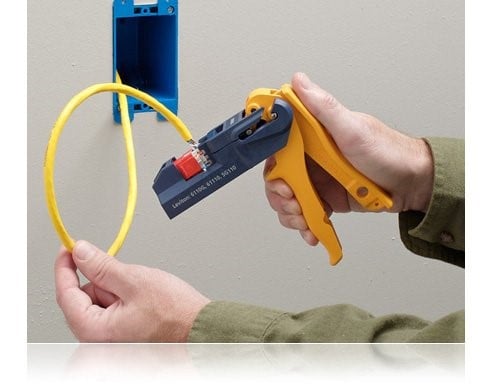Know the Punch Line
July 23, 2019 / General, 101 learning, Installation and testing, Best Practices
Installers have been punching down copper twisted-pair cable for decades and still do so for terminating cables to IDC towers on jacks, patch panels and connecting blocks. While the practice hasn’t changed, punchdown tools have come a long way, and you now have some options at your fingertips. So how do you choose? Let’s take a closer look.
The Old Reliable One
One of most common and versatile punchdown tools is the standard impact tool. These tools feature a blade on one end and is used to press individual conductors into their perspective IDC slot to make contact.

Designed to provide the right amount of force needed to terminate the conductors, these tools are typically available with 66 and 110 blades to accommodate the different types of connectors – 66 blocks used to punch down 22 through 26 AWG wire used in traditional telephone systems and the more updated 110 blocks typical for Category 5e and 6 patch panels and jacks.
You’re going to need this tool if you’re punching down individual conductors. Since they have long been known to cause hand fatigue, especially when dealing with hundreds (or thousands) of connections, selecting a tool with an automatic spring handle and a rubber, ergonomic handle can help.
And while they are simple in nature, there are additional features you can look for to make the job easier. For example, Fluke Networks’ internationally-recognized D914 Impact Tool includes a built-in hook and spudger to aid in removing wires from any style block and removing cross-connect modules from mounting brackets. It also includes extra blade storage in the handle, so you can easily accommodate both 66 and 110 blocks on the job site.
The Multi-Pair Labor Saver
When it comes to punching down, it doesn’t make sense to punch down every single conductor separately when you’re punching all 4 pairs of a twisted-pair cable to multiple blocks and/or jacks. Talk about hand fatigue! That’s where multi-pair punch-down tools come in handy.

Ideal for terminating multi-pair Category 5e for voice systems, 110 block multi-pair punchdown tools terminate and cut up to 5 pairs of wires simultaneously to save time and labor. When you’re terminating a wall of 110 blocks, this tool certainly comes in handy – on a 25-pair cable, that’s just 5 punches compared to 50 if using a single conductor punchdown tool!
When it comes to terminating RJ-45 jacks either in a patch panel or at the work area, you’re always going to be punching down 8 wires so multi-pair tools make a lot of sense. Plus, when it comes to terminating jacks in applications like Gigabit and higher Ethernet that utilize all 4 pairs, consistency in termination across all pairs is vital to performance. Punching down all pairs at once is the best way to ensure consistency.
The issue with punching down twisted-pair cable to jacks is that each manufacturer has its own jack design, which is why most manufacturers offer their own proprietary multi-pair jack punchdown tools.
To accommodate some of the more high-volume jack types on the market, Fluke Networks also offers a multi-pair jack punchdown tool. With one squeeze of the ergonomic handle, the JackRapid™ Jack Termination Tool seats and terminates all wires simultaneously using various blade heads for a range of jack types, including connectors from Leviton, Panduit and CommScope – just to name a few. JackRapid also has a built-in convenient stripper right in the handle so it’s really two tools in one.
Regardless of the type or make of the connector you’re terminating; the key is to be aware of what you’re installing and make sure you have the right punchdown tool for the job—before you get to the jobsite!




